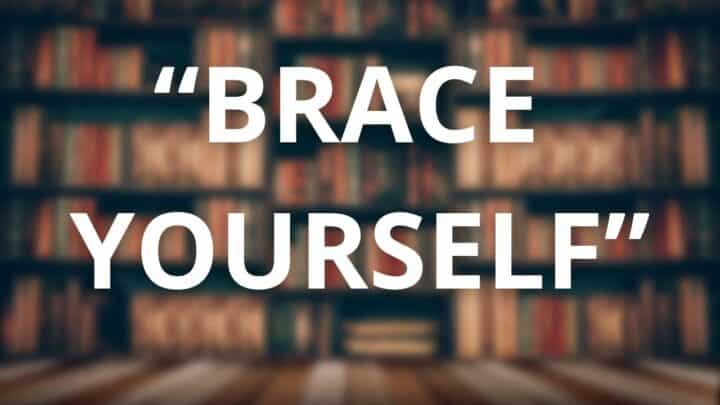If you somehow managed to miss watching Game of Thrones on TV, you have no doubt seen some of the memes, made popular by the series on the Internet, stating ‘Brace yourselves – Winter is coming’, or similar dire warnings.
The pilot series was indeed entitled, “Winter is Coming”, and Ned Stark did utter these words but he did not preface them by saying “Brace yourselves”. This part was added by Internet enthusiasts.
What does ‘Brace yourself / selves’ mean?
Brace yourself can be meant figuratively or literally. You can brace yourself physically, mentally and emotionally. If you have ever stood for long periods in a crowded bus or subway, you understand the need to constantly maintain your posture, despite the pressures of surrounding passengers and the movement of the vehicle. You ‘brace yourself’ psychologically for an impending trial, disaster or shock, for example, ‘winter is coming’. Not only do you need to stock up for times of want but you need to adjust your attitude and thinking to cope with a future hardship.
Origins of the expression ‘Brace yourself’
The term originated from the French word, ‘bras’, which translated means arms, but also referred to the armour that was worn on the forearms.
It is thought to have entered the English language when the Normans came over to the British Isles from France.
Its original meaning was to grasp firmly or to steady yourself, using your arms. Presumably, the ride over on the ship was as challenging as a modern day bus ride.
The word ’embrace’, meaning to enfold in one’s arms, is also derived from the same origin.
Other terms related to the word ‘Brace’
The word, ‘brace’, can be used as a noun or a verb. In the term, ‘brace yourself’, it is used as a verb.
Nouns
In modern times, braces have been developed for other body parts, such as legs that do not have their full function, and teeth that need straightening.
A recent undercover FBI investigation was named ‘Operation Brace Yourself’.
It targeted medical practitioners that were receiving kickbacks, from manufacturers, for fraudulently prescribing unnecessary braces to elderly patients.
Braces for men’s trousers go in and out of fashion. If not worn to make a style statement, they are used, in lieu of a belt, to prevent the wearer’s pants from falling down.
Brassieres, later shortened to ‘bras’, are women’s undergarments. They were designed to enhance the shape of a woman’s figure. Early prototypes were tortuous and constricting devices.
Brace can also be used as a collective noun, meaning a pair.
A brace of ducks, a term often used in hunting, means that two ducks have been captured or shot. In modern days, two goals in a soccer match is called a brace.
Verbs
Buildings are braced to help strengthen or support the final structure. These can take the form of cross beams or diagonal stays.
You tune or brace a drum by tightening or loosening the screws on the rim. This has the effect of altering the tension on the skins, and the tone.
Hopefully, we never get to hear the words, “Brace for impact!” This would be the command given by the pilot, to the passengers of an airplane, which is about to crash land.
The figurative meaning of ‘Brace yourself’
This is a call to draw on internal reserves in order to meet some testing, unnerving and most likely unpleasant event. No one else can do it, only you can.
In a sense what is anticipated will have an impact on you, but not necessarily physically.
You have been issued a forewarning. The event is in the future. There is time for you to prepare and fortify yourself mentally, even if that time is short.
Ways to use ‘Brace yourself’
The term is usually used as an imperative statement, in the form of a friendly warning. Whether or not to carry out the command is a choice made by the person receiving the message.
On its own, it is a complete sentence. It is implied that the warning is targeted towards the second person, and is equivalent to saying,
The short form of the command is usually followed by an exclamation mark which denotes urgency. The longer form does not convey as much need for immediate action.
It can be used in a joking sense, for example, when you await the bill at an expensive restaurant,
….. or your in-laws are about to arrive for an extended stay.
It could also be used when the circumstances are potentially life-changing or threatening, as in,
With all the modern conveniences available today, winter is no longer a physical threat to most of us, but to some it is a psychological trial.
David Sedaris, the American humorist, used it philosophically when he was quoted as stating,
The plural form is ‘brace yourselves’, obviously used when talking to more than one person, such as team members.
It could be used to address crowds or an audience.
These are predictions that are issued so regularly that few people pay attention anymore.
The term can also be used when referring to the first or the third persons.

Hey fellow Linguaholics! It’s me, Marcel. I am the proud owner of linguaholic.com. Languages have always been my passion and I have studied Linguistics, Computational Linguistics and Sinology at the University of Zurich. It is my utmost pleasure to share with all of you guys what I know about languages and linguistics in general.

